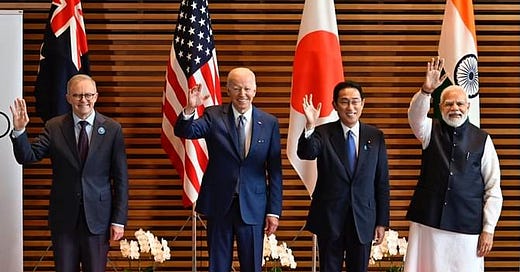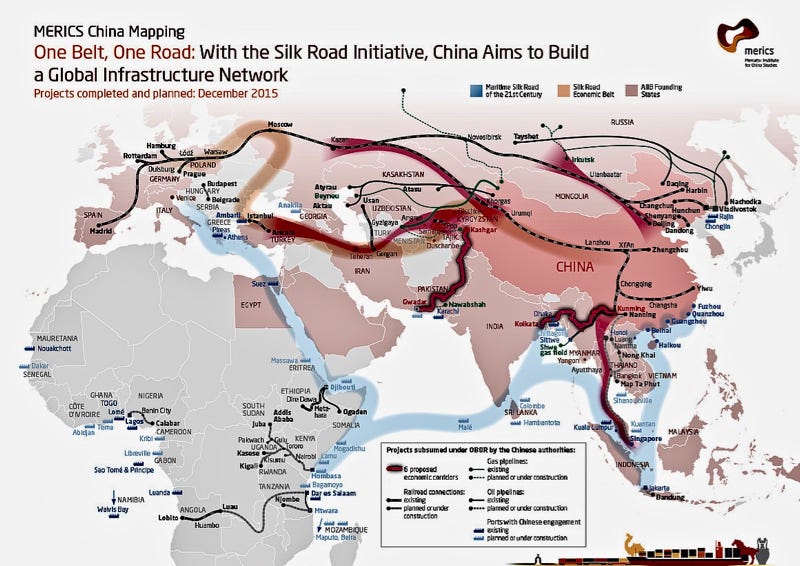A version of this essay was published by Swarajya magazine at https://swarajyamag.com/world/the-quad-will-china-dominate-the-indo-pacific-as-the-us-reverts-to-atlanticism-what-can-india-do
A lot has happened in the last week or two: POTUS Biden’s visit to Japan for a Quad summit and related economic moves; China’s outreach to Pacific Islanders for security pacts; and the World Economic Forum pow-wow in Davos. In some sense, the Ukraine war and related disruptions have taken a back seat, even though related inflation and shortages are a long-term story.
In my opinion, the Biden Administration is pursuing self-defeating policies as far as the Indo-Pacific is concerned. On the one hand, it may be because (as is the norm in India) one political party wants to undo whatever their rival had done when they were in power. On the other hand, there is a curious lack of historical memory about great-power games: the US seems to be either blase about, or reconciled to, Chinese domination of Asia/the Indo-Pacific.
None of this is good as far as India is concerned. In a harsh analysis of India’s clashes on the Kashmir/Tibet border with China, two anonymous but trenchant critics suggest India has been defeated already: “China-India Border Crisis Has Quietly Resulted in Victory For Beijing’, based on the fact that the Chinese military buildup is well-nigh impossible for India to overcome.
Meanwhile, there is increasing criticism of American involvement in – indeed responsibility for – prolonging the Ukraine war, surprisingly from the pro-Democrat, pro-war pages of the New York Times: “The War in Ukraine May Be Impossible to Stop. And the US Deserves Most of the Blame.” A slightly dated (April 1) article on “The Military Situation in Ukraine” had already given a cogent explanation of how reality on the ground was vastly different from the narrative.
What I fear is that Ukraine will become a quagmire for not only Russia, but also the US. As the NYT op-ed said, it’s not much of a leap from a proxy war to a secret war. The US is rather good at getting into unfortunate messes like this, and then having to declare victory and run like hell: see Vietnam or Afghanistan.
Two brutal articles from Tablet magazine, “Three Big Questions That the American Establishment Got Wrong” and “Wingnuts vs. Factions: The two theories of American government—one fantasy, one reality” purport to show how making bad, often really bad, decisions is par for the course for US administrations, in particular Democrats.
All this presages the possibility that Ukraine will be a tar baby for the US and its NATO allies, and a drain on their national treasuries. It also means that their national attention will be riveted on Russia and Ukraine for the foreseeable future, leaving China free to run rampant in Asia. Democratic Party power brokers are anyway Atlanticists fighting the Cold War all over again.
Let us, therefore, consider the Indo-Pacific from a perspective where the US is increasingly hors de combat. There is this theory of the “three island chains” in the Pacific as first propounded by American John Foster Dulles, according to CSIS.org, which further states that today we have to add two more island chains in the Indian Ocean.
John Foster Dulles is attributed with designating the islands stretching from the Kurils, the Japanese home islands, and the Ryukyus to Taiwan, the Philippines, and Indonesia as the “first island chain” in the 1950s. The second chain stretches from Japan through the Marianas and Micronesia, and the third is centered on Hawaii...
The addition of a fourth and fifth chain in the Indian Ocean would better describe emerging Chinese maritime strategy. Chinese naval planners hope to deny adversaries the ability to operate within the first island chain during a conflict, contest control of the second island chain, and operate as a blue water navy within the third island chain. A new fourth island chain through the middle of the Indian Ocean would reflect China’s ability to challenge its geostrategic neighbor India with dual-use facilities in Gwadar, Pakistan, and Hambantota, Sri Lanka. A fifth island Chain, originating from China’s base at Doraleh, Djibouti, would reflect Beijing’s ability to pursue its developing commitments afar, such as harnessing economic resources, conducting anti-piracy operations, and protecting Chinese living abroad. [emphasis added]
This is alarming, as the ‘fourth island chain’ is basically the ‘String of Pearls’ intended to strangle India and tie it down in the so-called ‘South Asia’, by negating its undoubted geographic advantage of straddling the sea lanes in the Indian Ocean. The Chinese submarine pen at Hainan in the South China Sea, with easy access to the Indian Ocean via the Straits of Malacca, is already a threat to Indian interests and blue-water navy aspirations.
In addition, China is currently in the middle of a furious ship-building frenzy, so they will also have surface ships, including aircraft carriers, capable of projecting force a long way into the Indian Ocean. Just as they have done in the Himalayas, and the South China Sea, China is using ‘below-the-threshold of war’ tactics to build up its capability until one day its foes are forced to submit. Degringolade.
POTUS Biden has made it clear that his administration has very little interest in Asia. He made three trips to Europe before his very first trip to Asia: a quick visit to Japan (and South Korea), where he attended a meeting of the Quad and a coming-out party for the newest American-mooted economic proposal, the Indo-Pacific Economic Framework. This seems to be too little, too late, after the US exited the Trans-Pacific Partnership.
The IPEF also seems like a face-saving measure, and it is increasingly evident that Biden’s alleged new enthusiasm for Asia is as empty as earlier POTUS Obama’s botched ‘pivot to Asia’, which was a lot of hot air with no substance. I also remember with fury Obama’s granting of hegemony over ‘South Asia’ to China: like the Pope once divided the world between Portugal and Spain. As though Obama were dispensing papal bulls.
As Indian geostrategist Brahma Chellaney suggests on Nikkei Asia in “Biden’s empty Taiwan rhetoric reveals Quad’s core weakness”, Biden’s statement about US military support for Taiwan in case of a Chinese invasion may be mere bravado.
There are two reasons. The first is that, as Biden’s minions clarified after his alleged gaffe, US military involvement is not within the scope of US agreements with Taiwan and/or China, which maintain the fiction of “One China”. The second is that, given its diminished industrial capacity (China has hollowed it out), the US cannot fight two major wars at once: Ukraine and Taiwan.
To emphasize their disdain for the alleged ‘pivot’, the Chinese sent strategic nuclear bombers towards Japan while Biden was there, accompanied by Russian bombers. As I write this, China has just sent 30 warplanes into Taiwan’s air defense zone. The signals are clear: they threaten to invade Taiwan.
In the meantime, China is attempting to expand its footprint in the Indo-Pacific. It scored a coup with the Solomon Islands where it signed a wide-ranging agreement. According to a podcast from The Economist, a leaked draft shows that the agreement allows Chinese police and soldiers to be deployed in the Solomons for a broad range of reasons. It stops short of setting up a military base, but only just.
Beyond this, Chinese FM Wang Yi had a blitzkrieg in the Pacific, visiting 8 island nations over 10 days, and on May 30th, he signed agreements in Fiji with a consortium of 10 of them. A draft talked about trade, tourism, security, training of police, forensic labs, and cyber-security, according to The Economist podcast Base Motives? China in the Pacific.
The entire Belt and Road Initiative was a covert effort to gain access to ports, and turn them into Chinese military bases (although it has stalled a little now because of its predatory debt-trap diplomacy side-effects, as best seen in Sri Lanka). Beyond Djibouti in 2017, Gwadar and Hambantota, there are others like Cambodia’s Ream military base where China has facilities.
China is also quite likely causing the sharp spike in global food prices. Economist Shamika Ravi tweeted as follows, and this is a good reason why India did a U-turn on wheat exports: instead of enabling Chinese proxies to buy it up, India will only do government to government deals.
Thus the picture is of a diffident America shuffling off into Atlanticist and Anglosphere dead-ends like AUKUS (Britain brings almost nothing to the picture in the Indo-Pacific), while a more confident China is expanding its reach. Its saber rattling threatens Taiwan immediately, and India, Japan and South Korea more indirectly.
The context of the Quad is also a far cry from what Abe Shinzo first envisaged as a tight military and economic alliance. It is pretty much a mere talking-shop. For instance, it is clear that none of Australia, Japan, or the US will send a single soldier to fight China on India’s behalf on the Kashmir/Tibet border. The creation of AUKUS (there are rumors about JAUKUS with Japan and CAUKUS with Canada as well) basically means India is being left out in the cold. Again. It has to depend on itself. Atmnirbharata.
There is talk of a Quad-Plus, including South Korea and New Zealand. But not Vietnam and Indonesia, which are more significant? New Zealand, especially under woke Jacinda Ardern, is marginal; in fact Australia is also of little interest in the Indian Ocean. There is also political instability in Australia: Scott Morrison was replaced by Anthony Albanese overnight.
I can remember at least five-six Australian PMs in the recent past, including die-hard Sinophile Kevin Rudd. How can you have continuity in such a situation? How can anybody depend on Australia to deliver on Quad? Similarly, Japanese PM Kishida Fumio is a far cry from the sensibly militaristic and nationalist Abe Shinzo.
In the US, the switch from Donald Trump to Joe Biden has meant chaos regarding the Indo-Pacific. And after this November’s elections, it is likely that Biden will be a lame duck: his approval numbers keep hitting new lows, and hostile Republicans are likely to take over the Senate, leading to a war of attrition: bad news for foreign policy.
In the middle of all this political turmoil, it is hard to imagine that the Quad is going to get better.
Meanwhile, the developed nations of the West are merrily carrying on with their old agenda as in the Davos shindig, as though there is no end in sight for the party. Rana Foroohar of the Financial Times sounded a warning, as if one were necessary in the wake of the carnage of stock market crashes and soaring inflation. But no, laissez les bon temps rouler! Let the good times roll!
And that’s exactly what India is up against. The rest of the world (with the possible exception of Japan) does not care. India has to assume it can only depend on itself, Quad or no Quad. It has to build up its military and economic muscle, and industrialize while keeping a low profile. The Thucydides Trap is a likely scenario, and presumably it will exhaust both the protagonists, leaving the door open for India to ascend to the G3 and then to the G1.
1850 words, June 1, 2022
















Share this post